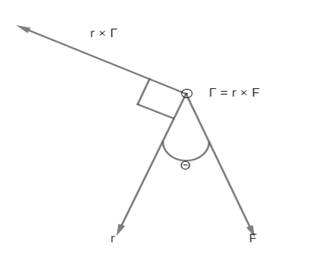The torque of a force ![]() about a point is defined as
about a point is defined as ![]() Suppose
Suppose ![]() and
and ![]() are all nonzero. Is
are all nonzero. Is ![]() always true? Is it ever true?
always true? Is it ever true?
This is never true. We can calculate the answer by using vector triple product. But let us solve it intuitionally.
Let us assume the angle between r and F is θ. The torque Γ produced will be in a direction outside of the plane of paper (just by using right thumb hand rule).

Now ![]() . So the angle between
. So the angle between ![]() and F is always
and F is always ![]() .
.
Hence, the statement can never be true. It can be antiparallel ( ![]() ),but can never be parallel.
),but can never be parallel.
1